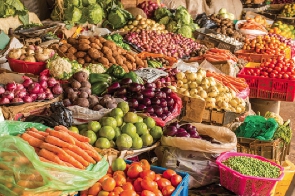 File photo: Foodstuff displayed
File photo: Foodstuff displayed
The country’s food security balance sheet, according to data from the Chamber of Agribusiness Ghana (CAG), has hit a negative two percent.
CAG’s Chief Executive Officer, Anthony Selorm Morrison, explained that food security – considering the food in storage or reserves, vis-à-vis volume of food imported and compared to national consumption demands – has fallen two percent.
This is despite government’s flagship programmes including Planting for Food and Jobs (PFJ) and Rearing for Food and Jobs – initiatives government banked its hopes on to transform food security.
CAG attributed the dwindling domestic production of food items to lack of commitment by governments over the last two decades, explaining that spending on agriculture or food production over the period has been inadequate and, in most cases, misdirected.
Data from CAG indicate that the country’s food importation bill has jumped to in excess of US$5billion per annum.
To change this narrative, he told the B&FT that government must embark on the right investment procedures. Though the flagship PFJ has been running for the last seven years, the amount of investment made is only estimated at GH¢6billion.
This amount, which is less than US$1billion in current terms according to CAG, is woefully inadequate for the required investment to put the country on a path to food security.
“The PFJ is only a political tool providing a pint-size solution to the bigger problem. How do we seek to achieve a food security target when we are investing less in production compared to how much food we import?” Mr. Morrison questioned.
Ghana’s quest to ensure food security per the current estimated amount expended on food imports means the country will have to allocate not less than US$1billion each year to food production in incremental demands, at least for the next ten years, to achieve a meaningful target.
This year, government is spending almost US$52million on its PFJ programme according to the 2023 national budget.
As a signatory to the Comprehensive African Agricultural Development Programme in 2003 (the Malabo Declaration), of which member-countries were expected to increase agricultural investment to 10 percent of annual budgets, the country has consistently struggled to meet even two percent of budgetary allocation to the sector.
The B&FT has observed that total allocation to the agriculture sector in the 2023 national budget is only 1.13 percent – woefully short of the Malabo pledge.
Recommendations
The Chamber recommended that government should adopt internal mechanisms to curb the challenge and improve the situation.
“Over 50 percent of non-essential commodities on shelves across all supermarkets must be avoided, with priority to local industries to produce such,” CAG noted.
Mr. Morrison indicated that special protection mechanisms must be given to local industries; and quota systems allocated for the production of items including fruit-juice, tooth-picks, matches, and candles among others, adding: “These items are contributing a huge forex burden to imports and causing the cedi’s depreciation”.
Watch the latest edition of BizTech and Biz Headlines below:
Watch the latest edition of Business Moments below: